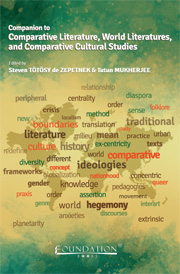Book contents
- Frontmatter
- Contents
- Introduction to the Companion to Comparative Literature, World Literatures, and Comparative Cultural Studies
- PART 1 Theories of Comparative Literature, World Literatures, and Comparative Cultural Studies
- PART 2 Comparative Literature in World Languages
- PART 3 Examples of New Work in Comparative Literature, World Literatures, and Comparative Cultural Studies
- African Literatures and Cultures and the Universal of Motherhood
- World literatures and the Case of Joyce, Rao, and Borges
- Abject Spaces and the Hinterland in Bolaño's Work
- The Motif of Fleeing in Gao's Work
- Arab Fiction and Migration in the Work of Haqqi and Salih
- Sexual Identity and Translation in Prime-Stevenson's Work
- The Notion of Life in the Work of Agamben
- Aesthetics, Opera, and Alterity in Herzog's Work
- An Intermedial Reading of Paley's Sita Sings the Blues
- Painting and Representation in Teaching Balzac
- PART 4 Multilingual Bibliography of Books in Comparative Literature, World Literatures, and Comparative Cultural Studies
- Index
African Literatures and Cultures and the Universal of Motherhood
from PART 3 - Examples of New Work in Comparative Literature, World Literatures, and Comparative Cultural Studies
Published online by Cambridge University Press: 05 April 2014
- Frontmatter
- Contents
- Introduction to the Companion to Comparative Literature, World Literatures, and Comparative Cultural Studies
- PART 1 Theories of Comparative Literature, World Literatures, and Comparative Cultural Studies
- PART 2 Comparative Literature in World Languages
- PART 3 Examples of New Work in Comparative Literature, World Literatures, and Comparative Cultural Studies
- African Literatures and Cultures and the Universal of Motherhood
- World literatures and the Case of Joyce, Rao, and Borges
- Abject Spaces and the Hinterland in Bolaño's Work
- The Motif of Fleeing in Gao's Work
- Arab Fiction and Migration in the Work of Haqqi and Salih
- Sexual Identity and Translation in Prime-Stevenson's Work
- The Notion of Life in the Work of Agamben
- Aesthetics, Opera, and Alterity in Herzog's Work
- An Intermedial Reading of Paley's Sita Sings the Blues
- Painting and Representation in Teaching Balzac
- PART 4 Multilingual Bibliography of Books in Comparative Literature, World Literatures, and Comparative Cultural Studies
- Index
Summary
Abstract: In her article “African Literatures and Cultures and the Universal of Motherhood” Remi Akujobi analyzes the place and the role of women in African tradition and interrogates the loci of motherhood in the production, circulation, and consumption of motherhood as a sacred, as well as a powerful spiritual component of women's life as represented in African literature and culture.
Introduction
Motherhood is often defined as an automatic set of feelings and behavior that is switched on by pregnancy and the birth of a child. It is an experience said to be profoundly shaped by social context and culture. Motherhood is also seen as a moral transformation whereby a woman comes to terms with being different in that she ceases to be an autonomous individual because she is one way or the other attached to another—her child. In many societies, motherhood is wrapped in many cultural and religious meanings—cultural as in what society thinks a mother should be, that is, some elements associated with a mother and what the practiced faith of a particular society attaches to motherhood. Motherhood assumes different names and shapes depending on the society that is practicing it. The word procreation or giving birth and nurturing new life, whether physically or otherwise, has led to different definitions for the words “feminine,” “maternal,” and “feminine spirituality” in many cultures, and religious traditions.
- Type
- Chapter
- Information
- Companion to Comparative Literature, World Literatures, and Comparative Cultural Studies , pp. 371 - 381Publisher: Foundation BooksPrint publication year: 2014



